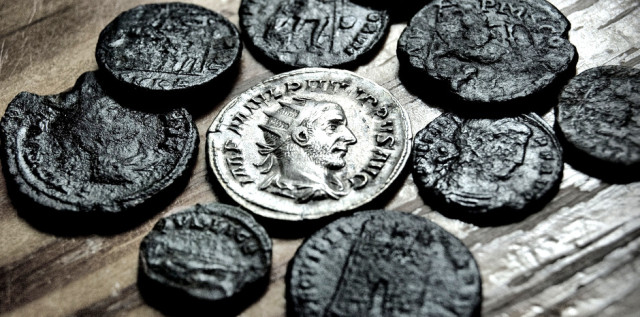Ancient Rome wasn’t built in a day, the old adage goes. It wasn’t torn down in a day either, but a good measure of its long decline to oblivion was the government’s bad habit of chipping away at the value of its own currency.
In this essay we refer to “inflation,” but in its classical sense — an increase in the supply of money in excess of the demand for money. The modern-day subversion of the term to mean rising prices, which are one key effect of inflation but not the inflation itself, only confuses the matter and points away from the real culprit, the powers in charge of the money supply.
In Rome’s day, before the invention of the printing press, money was gold and silver coin. When Roman emperors needed revenue, they did more than just tax a lot; like most governments today, they also debased the money. Think of the major difference between Federal Reserve inflation and ancient Roman inflation this way: We print, they mint(ed). The long-term effects were the same—higher prices, erosion of savings and confidence, booms and busts, and more. Here’s the Roman story.
Augustus (reigned 27 BC – 14 AD), Rome’s first real emperor, worked to establish a standardized system of coinage for the empire, building off of the Roman Republic’s policies. The silver denarius became the “link coin” to which other baser and fractional coins could be exchanged and measured. Augustus set the weight of the denarius at 84 coins to the pound and around 98 percent silver. Coins, which had only been sporadically used to pay for state expenditures in the earlier Republic, became the currency for everyday citizens and accepted as payment for commerce and even taxation in the later Republic and into the imperial period.
Historian Max Shapiro, in his 1980 book, The Penniless Billionaires, pieces various sources together to conclude that “the volume of money he (Augustus) issued in the two decades between 27 BC and 6 AD was more than ten times the amount issued by his predecessors in the twenty years before.” The easy money stimulated a temporary boom, leading inevitably to price hikes and eventual retrenchment. Wheat and pork prices doubled, real estate rose at first by more than 150 percent. When money creation was slowed (late in Augustus’s reign and even more for a time under that of his successor, Tiberius), the house of cards came tumbling down. Prices stabilized but at the cost of recession and unemployment.
The integrity of the monetary system would remain intact until the reign of Emperor Nero (54-68 AD). He is better known for murdering his mother, preferring the arts to civic administration, and persecuting the Christians, but he was also the first to debase the standard set by Augustus. By 64 AD, he drained the Roman reserves because of the Great Fire of Rome and his profligate spending (including a gaudy palace). He reduced the weight of the denarius to 96 coins per pound and its silver content to 93 percent, which was the first debasement of this magnitude in over 250 years. This led to inflation and temporarily shook the confidence of the Roman citizenry.
Many successive emperors incrementally lowered the denarius’s silver content until the philosopher-emperor, Marcus Aurelius (reigned 161-180 AD), further debased the denarius to 79 percent silver to pay for constant wars and increased expenses. This was the most impure standard set for the denarius up to this point in Roman history, but the trend would continue. Aurelius’ son Commodus(reigned 177-192 AD), a gladiatorial wannabe, was likewise a spendthrift. He followed the footsteps of his forebears and reduced the denarius to 104 coins to the pound and only 74 percent silver.
Every debasement pushed prices higher and gradually chipped away at the public faith in the Roman monetary system. The degradation of the money and increased minting of coins provided short-term relief for the state until merchants, legionaries, and market forces realized what had happened. Under Emperor Septimius Severus’ administration (reigned 193-211 AD), more soldiers began demanding bonuses to be paid in gold or in commodities to circumvent the increasingly diminished denarius. Severus’ son, Caracalla (reigned 198-217 AD), while remembered for his bloody massacres, killing his brother, and being assassinated while relieving himself, advanced the policy of debasement until he lowered the denarius to nearly 50 percent silver to pay for the Roman war machine and his grand building projects.
Other emperors, including Pertinax and Macrinus, attempted to put Rome back on solid footing by increasing the silver content or by reforming the system, but often when one emperor improved the denarius, a competitor would outbid them for the army’s loyalty, destroying any progress and often replacing the emperor. Eventually, the sun set on the silver denarius as Rome’s youngest sole emperor, Gordian III (238-244 AD), essentially replaced it with its competitor, the antoninianus.
However, by the reign of the barbarian-born Emperor Claudius II (reigned 268-270 AD), remembered for his military prowess and punching a horse’s teeth out, the antoninianus was reduced to a lighter coin that was less than two percent silver. The aurelianianus eventually replaced the antoninianus, and the nummus replaced the aurelianianus. By 341 AD, Emperor Constans I (reigned 337-350 AD) diminished the nummus to only 0.4 percent silver and 196 coins per pound. The Roman monetary system had long crashed and price inflation had been spiraling out of control for generations.
Attempts were made to create new coins similar to the Neronian standard in smaller quantities and to devise a new monetary system, but the public confidence was shattered. Emperor Diocletian (reigned 284-305 AD) is widely known for conducting the largest Roman persecution of Christians, but he also reformed the military, government, and monetary system. He expanded and standardized a program, the annona militaris, which essentially bypassed the state currency. Many Romans were now taxed and legionaries paid in-kind (with commodities).
Increasingly, Romans bartered in the marketplace instead of exchanging state coins. Some communities even created a “ghost currency,” a nonexistent medium to accurately describe the cost and worth of a product because of runaway inflation and the volatility of worthless money. Diocletian approved a policy which led to the gold standard replacing the silver standard. This process progressed into the reign of Rome’s first Christian emperor, Constantine (reigned 306-337 AD), until Roman currency began to temporarily resemble stability.
But Diocletian did something else, and it yielded widespread ruin from which the Empire never fully recovered. In the year 301 AD, to combat the soaring hyperinflation in prices, he issued his famous “Edict of 301,” which imposed comprehensive wage and price controls under penalty of death. The system of production, already assaulted by confiscatory taxes and harsh regulations as well as the derangement of the currency, collapsed. When a successor abandoned the controls a decade or so later, the Roman economy was in tatters.
The two largest expenditures in the Roman Empire were the army, which peaked at between 300,000-600,000 soldiers, and subsidized grain for around 1/3 of the city of Rome. The empire’s costs gradually increased over time as did the need for bribing political enemies, granting donatives to appease the army, purchasing allies through tributes, and the extravagance of Roman emperors. Revenues declined in part because many mines were exhausted, wars brought less booty into the empire, and farming decreased due to barbarian incursions, wars, and increased taxation. To meet these demands Roman leaders repeatedly debased the silver coins, increasingly minted more money, and raised taxes at the same time.
In a period of about 370 years, the denarius and its successors were debased incrementally from 98 percent to less than one percent silver. The massive spending of the welfare/warfare state exacted a terrible toll in the name of either “helping” Romans or making war on non-Romans. Financial and military crises mixed with poor leadership, expediency, and a clear misunderstanding of economic principles led to the destruction Rome’s monetary system.
Honest and transparent policies could have saved the Romans from centuries of economic hardships. The question future historians will answer when they look back on our period is, “What did the Americans learn from the Roman experience?”
(For more on lessons from ancient Rome, visit www.fee.org/rome).
Marc Hyden is a political activist and an amateur Roman historian. Lawrence W. Reed is President of the Foundation for Economic Education.
Marc Hyden
Marc Hyden is a conservative political activist and an amateur Roman historian.
 Lawrence W. Reed
Lawrence W. Reed
Lawrence W. (“Larry”) Reed became president of FEE in 2008 after serving as chairman of its board of trustees in the 1990s and both writing and speaking for FEE since the late 1970s.






 The incomes of households in the three middle income quintiles grew 40 percent between 1979 and 2011. Somewhat surprisingly, given the histrionics about the state of America’s poor, income in households in the lowest quintile was 48 percent higher in 2011 than it was in 1979.
The incomes of households in the three middle income quintiles grew 40 percent between 1979 and 2011. Somewhat surprisingly, given the histrionics about the state of America’s poor, income in households in the lowest quintile was 48 percent higher in 2011 than it was in 1979.





